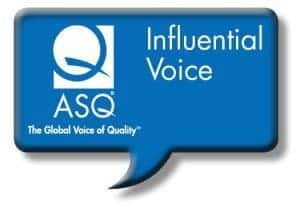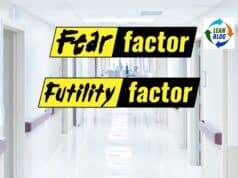In this month's installment of the “ASQ Influential Voices” blog series, ASQ President Paul Borawski asked, “Are Quality Professionals Happy On the Job?,” citing a study published in Forbes Magazine that named software quality assurance engineer as the “happiest job” in the U.S..
Being “happy” at work is a good thing, but I think we really desire a deeper level of engagement that brings professional satisfaction. As I wrote about here, the subtitle of my book Lean Hospitals now refers to “employee engagement” instead of “employee satisfaction.” I made this change based on my own improved understanding of the difference between satisfaction and engagement.
As I cited from my 2nd edition:
A recent [Blessing White] report defines full engagement as: “an alignment of maximum job satisfaction (‘I like my work and do it well') with maximum job contribution (‘I help achieve the goals of my organization')”.
I think quality professionals (including those working with Lean) tend to be generally unsatisfied. We're taught (or wired) to look at the gap between our current condition and the ideal. I think we tend to be “glass half empty” types, by nature, which probably leads us to be more unhappy than those who are more naturally satisfied with the “glass half full.” An engineer would point out the glass is ALWAYS full, even if it's half full with air, but that's a different discussion.
From my own experience, I can handle the gap between current and ideal as long as we're making progress. Having senior leaders that support and help drive real improvement lead to an environment where quality professionals can be happy and engaged. There's nothing worse than being in an organization where seniors don't care about quality or where they just give it lip service.
I've talked to many Lean professionals who are frustrated with their hospital's leadership. Being problem solvers, the quality professionals want to try to fix things. But, if the root cause of the organization's poor quality (and lack of improvement) is out of their control, it's often better to leave for greener pastures than to stay put and be miserable. Too many organizations try to “buy” happiness (through perks, bonuses, etc) instead of addressing the issues that would interfere with a person being aligned with achieving the organization's goal (and hopefully a deeper mission and purpose).
Would you describe yourself as being generally “happy” in your work? Are you engaged rather than satisfied? Which do you desire?
 Disclaimer: I'm part of the ASQ Influential Voices program. While I receive an honorarium from ASQ for my commitment, the thoughts and opinions expressed on my blog are my own.
Disclaimer: I'm part of the ASQ Influential Voices program. While I receive an honorarium from ASQ for my commitment, the thoughts and opinions expressed on my blog are my own.
p.s. Be sure to check out the special charity auctions I am running through May 6
Please scroll down (or click) to post a comment. Connect with me on LinkedIn.
Let’s build a culture of continuous improvement and psychological safety—together. If you're a leader aiming for lasting change (not just more projects), I help organizations:
- Engage people at all levels in sustainable improvement
- Shift from fear of mistakes to learning from them
- Apply Lean thinking in practical, people-centered ways
Interested in coaching or a keynote talk? Let’s talk.
Join me for a Lean Healthcare Accelerator Trip to Japan! Learn More










I am satisfied and happy with what I do as an internal lean consultant at a hospital. I think the key for me is that I have clients that are making progress in cultural and physical transformation. In my sphere of influence, I feel I am making an impact.
I can see why some would get frustrated if not getting progress though. I have joked with some peers that I can’t believe how some change agents whine and moan about how hard change is! The very nature of what we do is to figure out how to help organizations change! Why get frustrated about it?
I will say frustration is not always negative though. Sometimes not getting the results you want lead to new tactics. As Imai says “The kaizen spirit encourages thinking about how to change, rather than why it can’t be done.” The same philosophy translates into approaching people who aren’t making progress.
I’m glad you are happy with your important work in healthcare!
Some people are defeatist and quickly turn to whining and moaning when they face any minor challenge. That’s clearly not helpful.
But, some people are truly in situations where they best they can hope to do is to get out. If there’s zero leadership support for what you’re trying to do, that can be very frustrating (and I know from first-hand experience). You can try to “manage up” all you want, but sometimes one person can only do so much.
Some of the frustration that’s reported to me comes from situations where the hospital CEO wrongly expects that one person to make Lean happen in the organization. That’s a recipe for frustration and failure, I’d say.
I agree there comes a time when you have to give up especially when there is no leadership support or lean responsibility rests on one person’s sholulders.
Hopefully, people take some efforts to help leaders know that formula won’t work before they throw in the towel and leave. Try to arrange a tour or establish connections with leaders that understand Lean leadership. Share literature, blogs, & webinars with them that will show you are not the lone voice saying you need their involvement and others in the organization to make Lean successful. Maybe get an external consultant for a brief while to help leaders engage with what they need to do (much to my chagrin as an internal consultant, some leaders will listen more to an external consultant regarding their behavior change).
Once you have exhausted these attempts (maybe their are other suggestions), I think it is time to move on.
I agree that quality professionals “look at the gap between our current condition and the ideal” and that can lead to some frustration. I find that most in in the field though are much more satisfied and in a deep way happier than most (software developers maybe are ahead in my experience).
I do think that partially the issue is how you view “happiness.” If you view it as never complaining and just smiling all the time quality folks probably are not a great fit. If you think of “happiness” in the broader light those that signed the US Declaration of Independence meant when they wrote
“We hold these truths to be self-evident, that all men are created equal, that they are endowed by their Creator with certain unalienable Rights, that among these are Life, Liberty and the pursuit of Happiness.”
I think quality folks can fit pretty well. It goes back to your statement on a “deeper level of engagement.” Deming’s “joy in work” wasn’t about eating ice cream and playing foosball. Joy in work is about connecting to the fundamental need to be proud of what you do. I discussed these ideas in my own ASQ Influential Voices post http://management.curiouscatblog.net/2012/04/17/joy-in-work-in-the-quality-improvement-field/
Comments are closed.